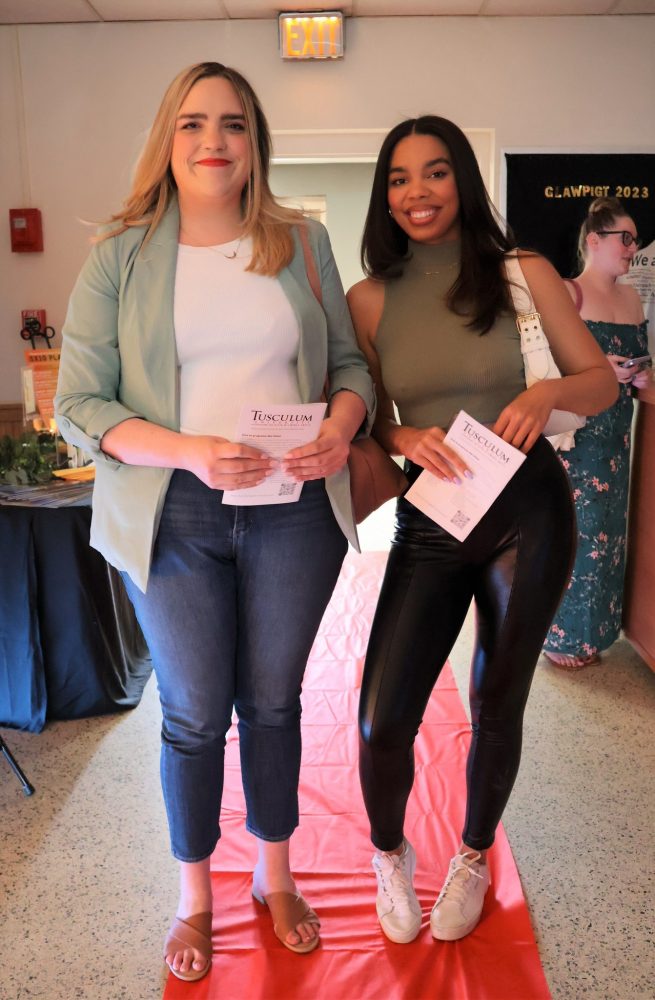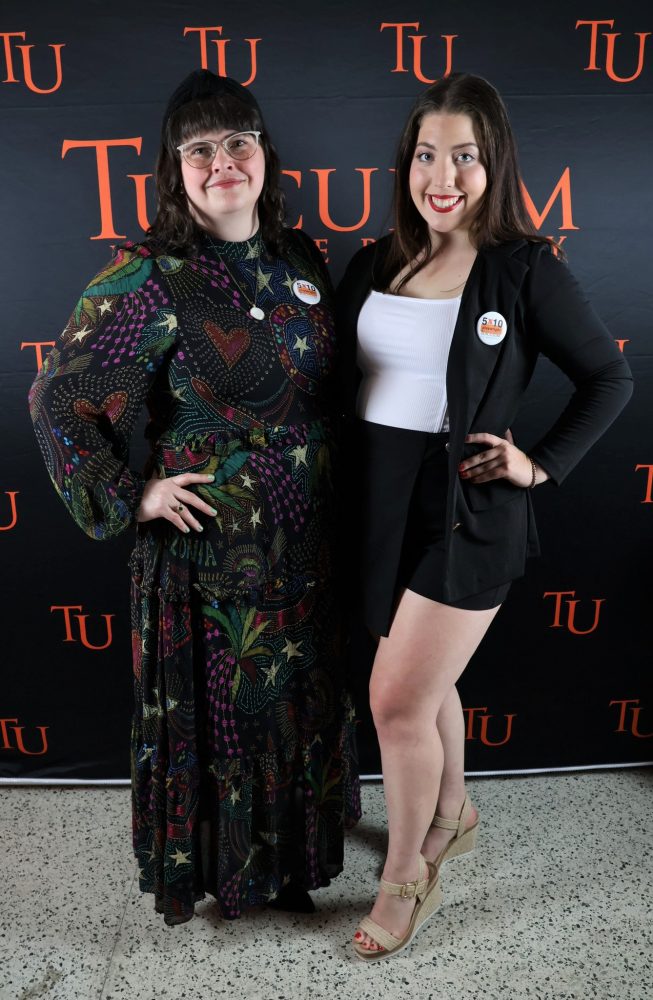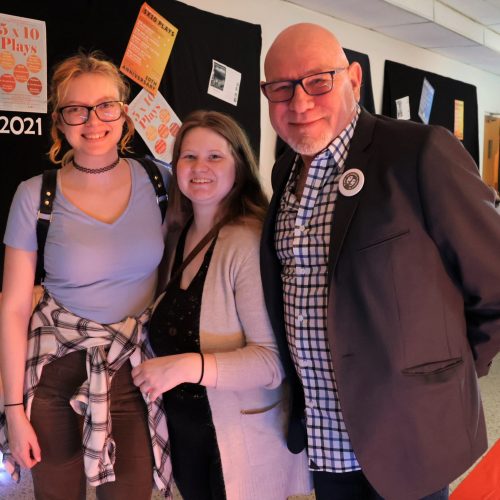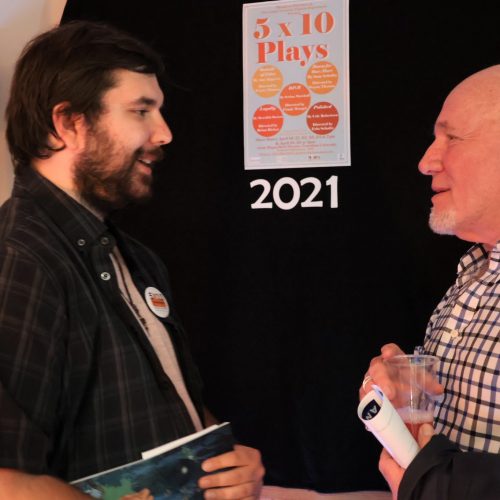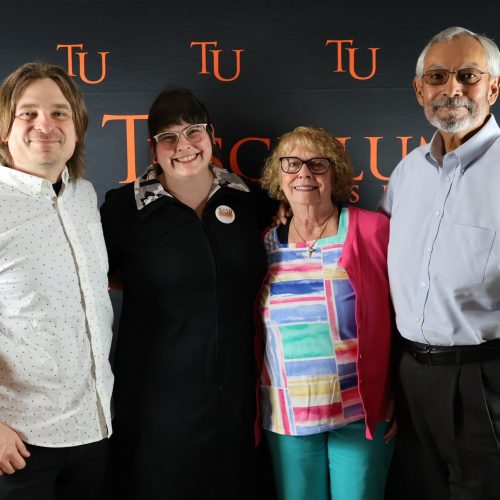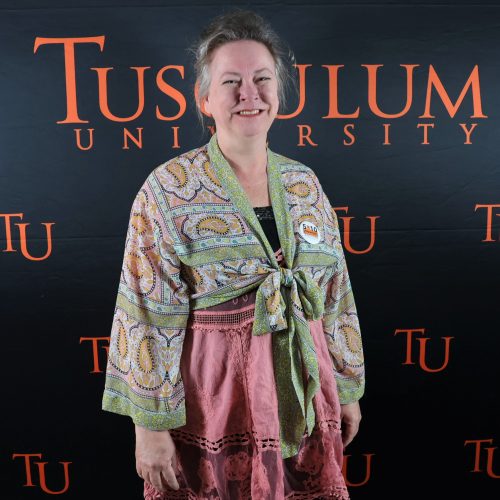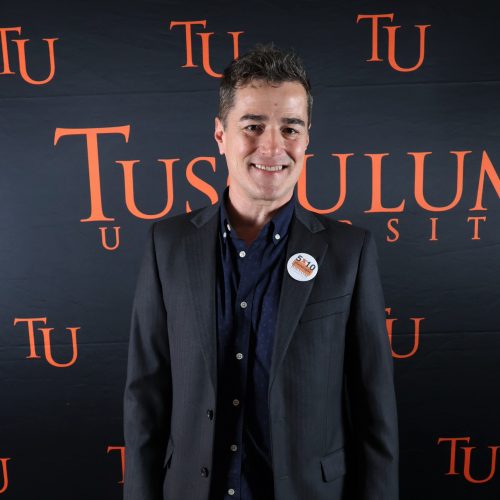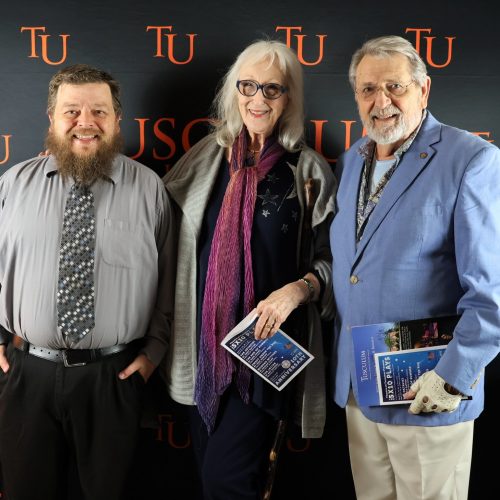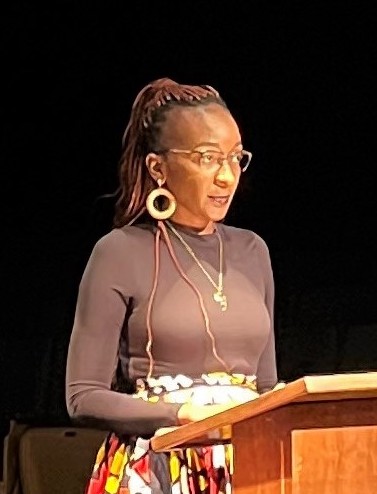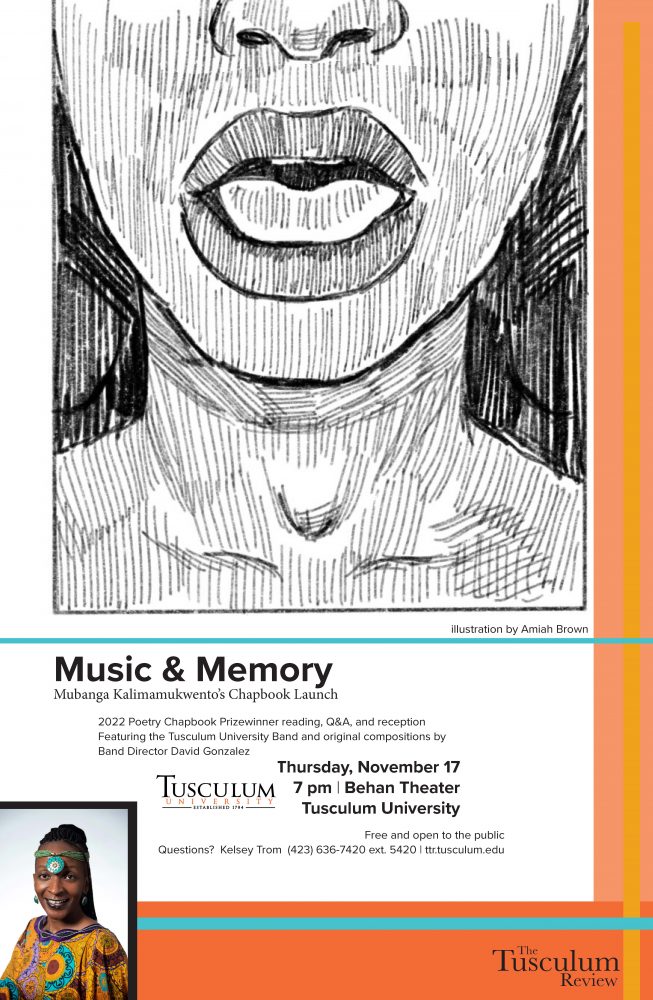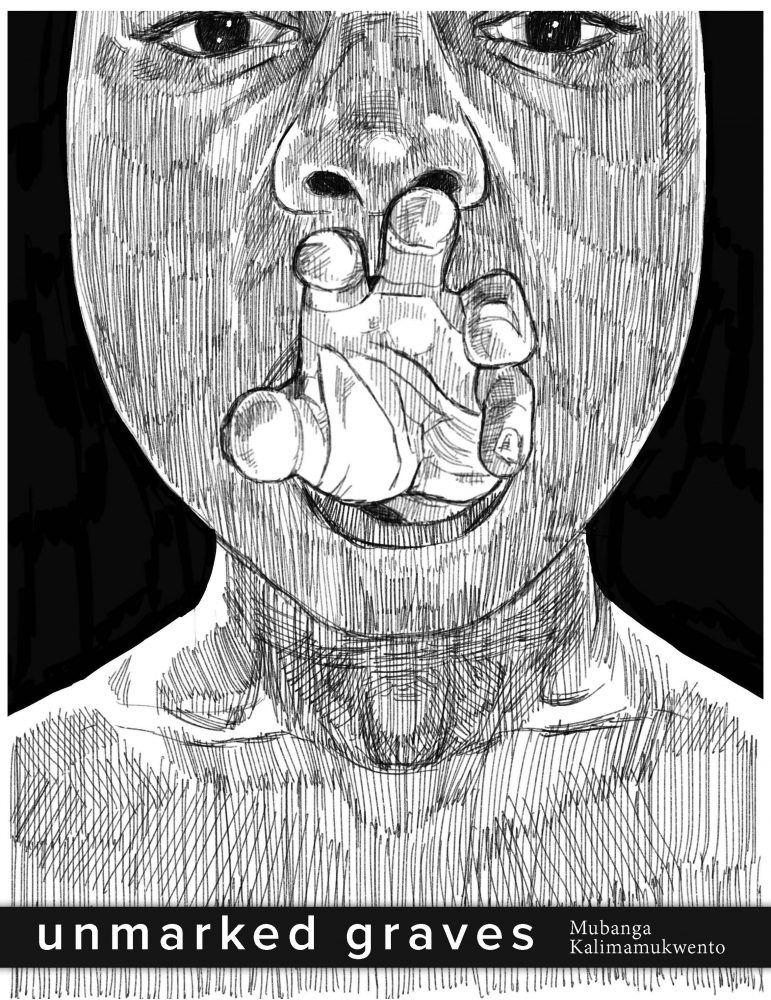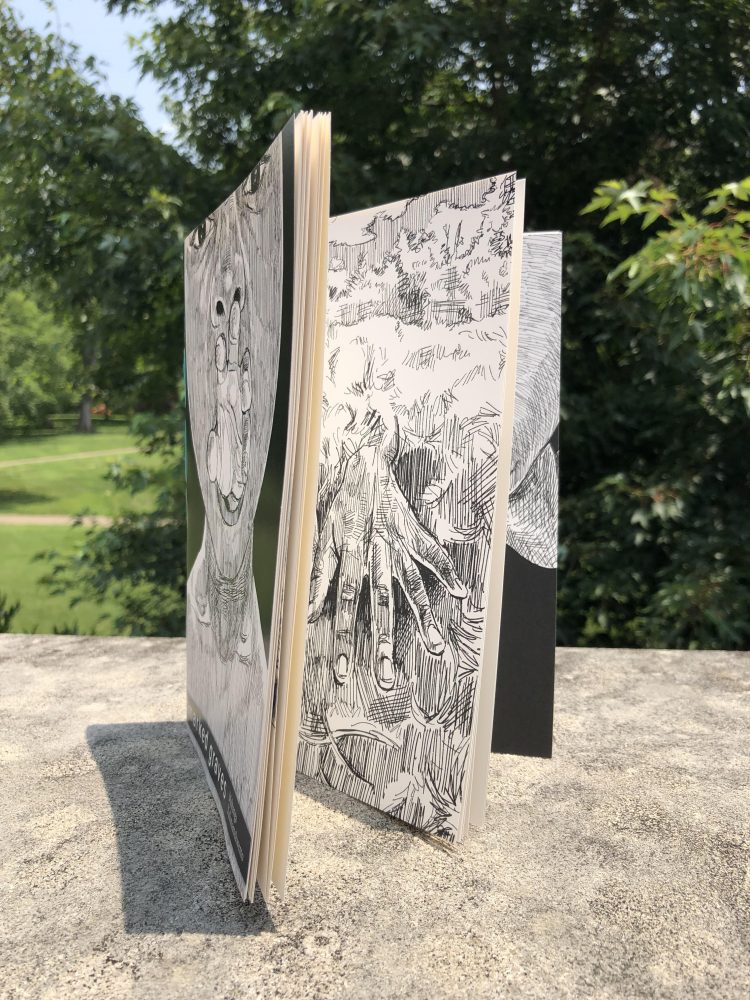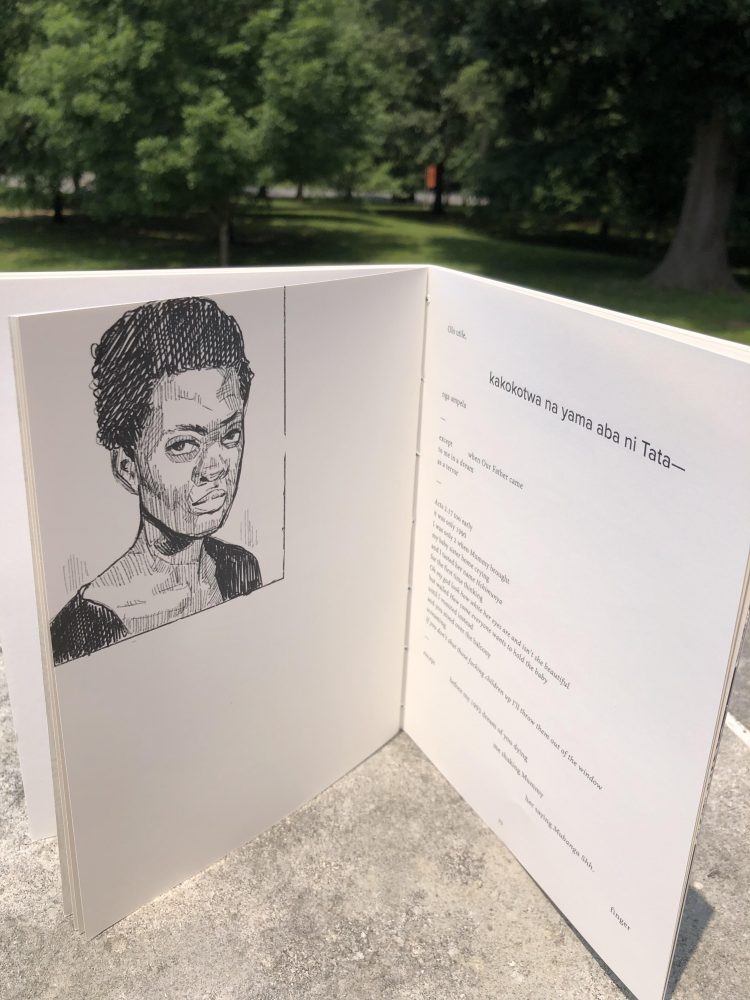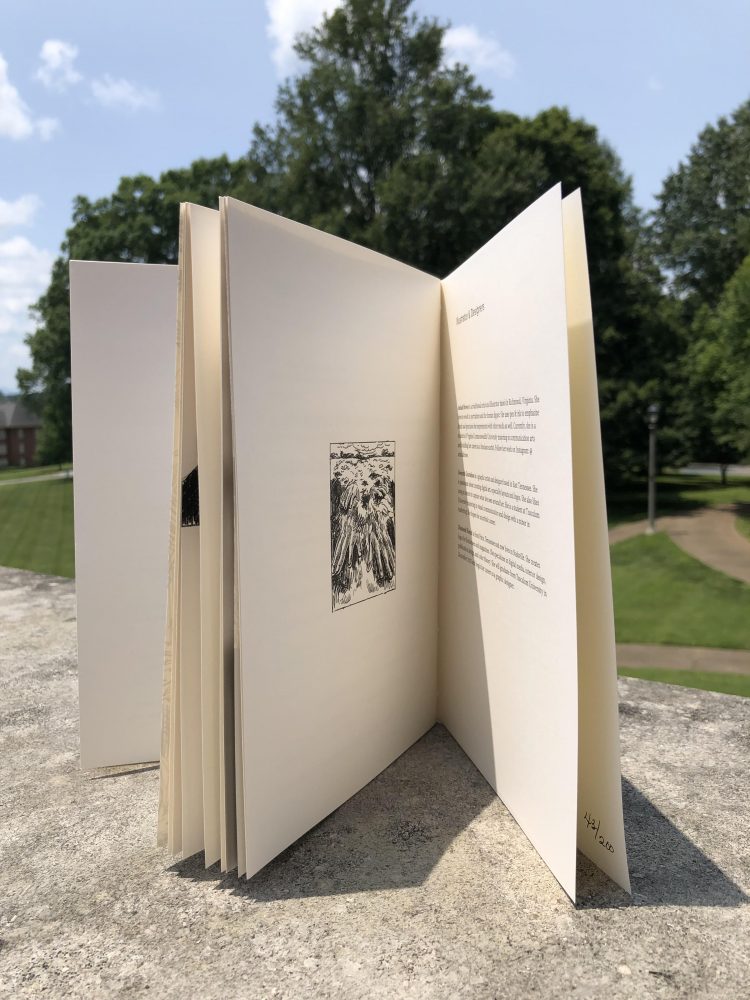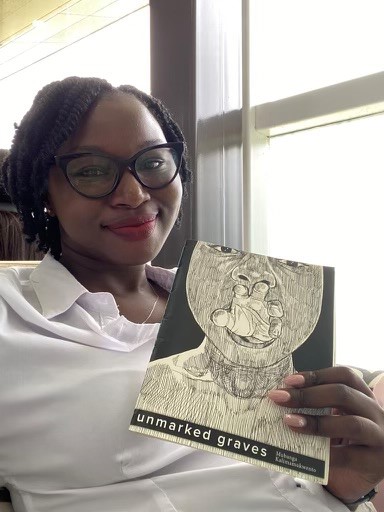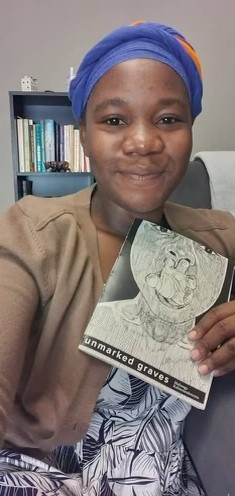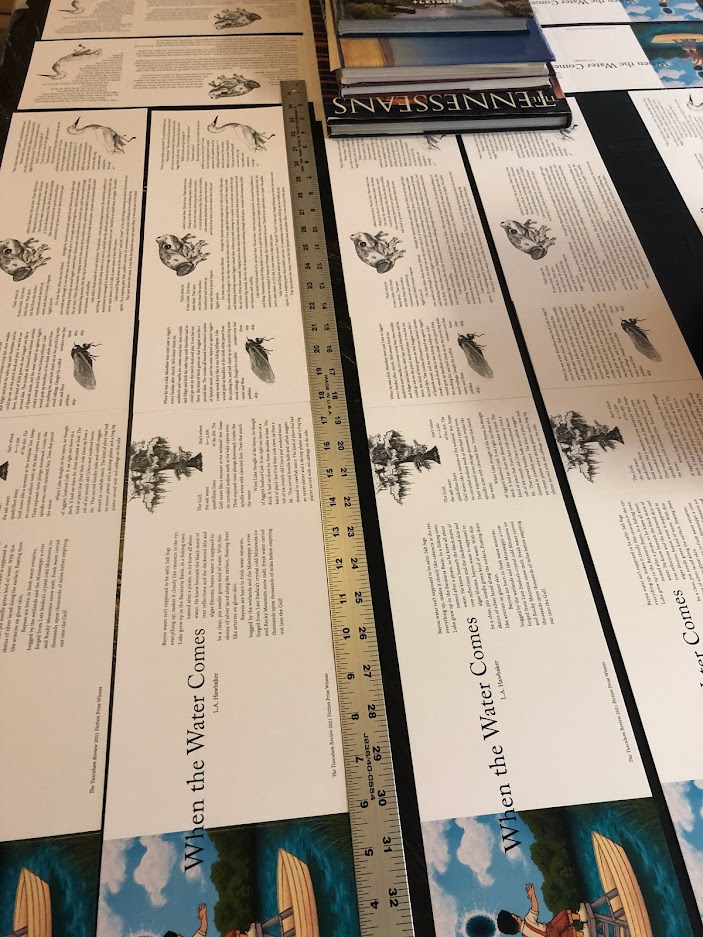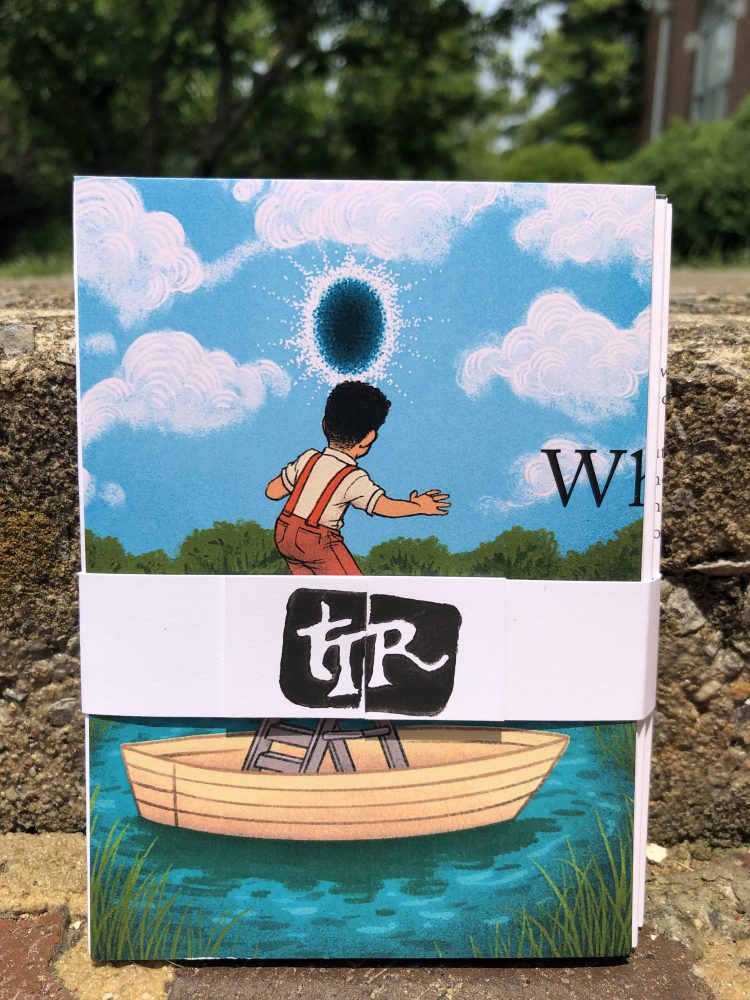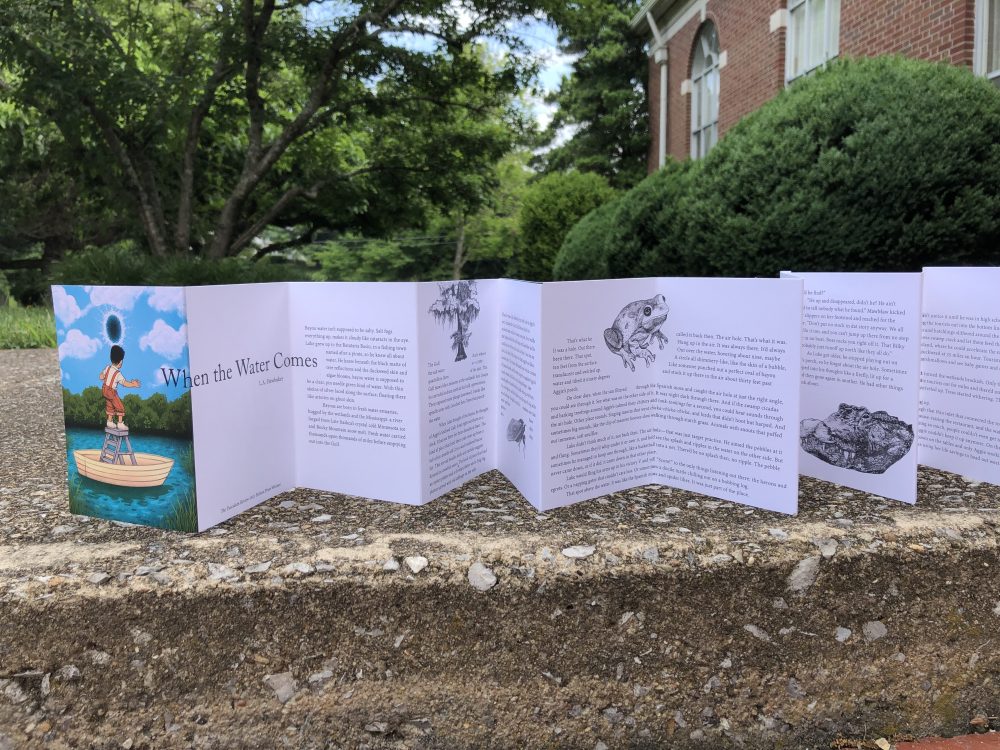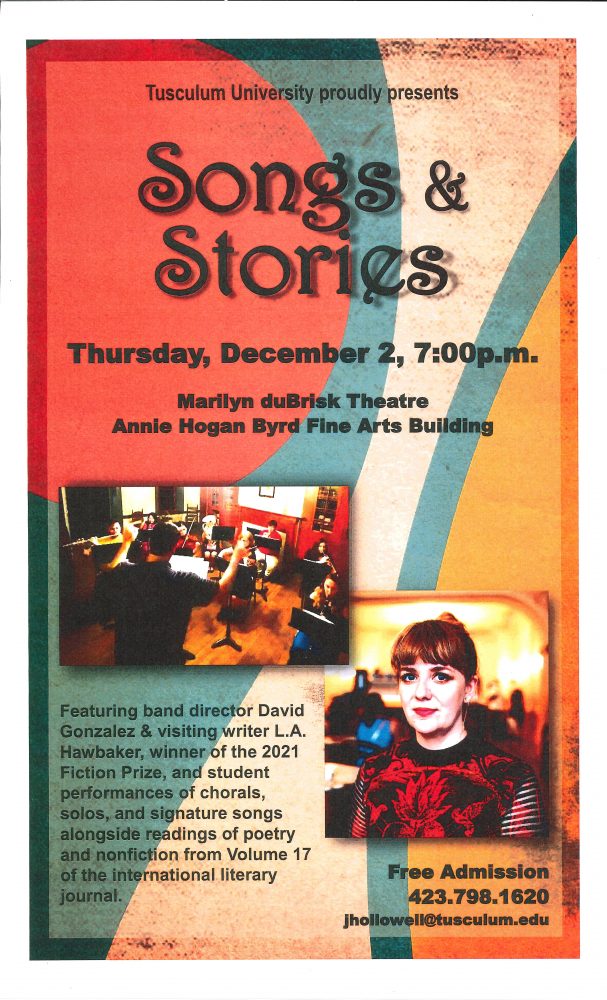Contest
2025 Fiction Chapbook Prize | judged by Jaime Cortez
The Tusculum Review Chapbook Contests | Chapbooks are short books of literature, appealingly packaged: an art and literary form. Although literary presses most often publish chapbooks of poetry, The Tusculum Review publishes single prose work chapbooks as well: one short story or one essay. Our annual chapbook contest rotates through the genres on a three-year cycle. We commission a well-matched artist to illustrate the winning work and design a chapbook whose aesthetics augment the text. The chapbook launches live in Greeneville, Tennessee in November, often with a live reading by the author, Q&A, and reception. Past chapbooks can be viewed on our website.
Our 2025 fiction chapbook contest, judged by Jaime Cortez, rewards a single short story and closes June 15, 2025. A prize of $1,500, publication of the story in The Tusculum Review’s 21st volume (2025), and creation of a limited edition stand-alone chapbook with original art is awarded for the winning story.
Contest judge Jaime Cortez is a California writer and artist based in Watsonville and the SF Bay Area. His writing and drawings have appeared in Kindergarten: Experimental Writing For Children (Black Radish Press), No Straight Lines (Fantagraphics), Street Art San Francisco (Abrams Press), and Infinite Cities (UC Berkeley Press). He wrote and illustrated the graphic novel Sexile for AIDS Project Los Angeles. His debut short story collection, Gordo, was published in 2021 by Black Cat, an imprint of Grove Atlantic. Gordo received national acclaim from the New York Times, San Francisco Chronicle, and the Minneapolis Star Tribune. It was nominated for the Carnegie Medal of Excellence in Fiction and the Lambda Literary Award for fiction, and was named a best book of the year by National Public Radio and Bookpage. Cortez received his B.A. from the University of Pennsylvania, and his MFA from UC Berkeley. Jaime’s website is www.jaimecortez.org.

2024 Nonfiction Chapbook Prizewinner | Mirela Musić
Guest judge Mary Cappello awarded the prize to Mirela Musić for “The Nature of Alaska”
Cappello writes: “Nothing about this essay can be anticipated. If the title leads you to assume a travelogue is on offer, or a natural history tour of a place ‘elsewhere,’ think again. Aesthetically speaking, ‘The Nature of Alaska’ shows an extraordinary command of movement across place and time; of the sinuous possibilities of sentences, the profoundly sensory ‘rightness’ and originality of words well-chosen, of phrases that resound, and of paragraphs, whose riffs, lyrical tempos, and subtle juxtapositions animate an understanding of the forces that roil beneath our daily lives but that often go un-named. This is an essay about the precariousness of sleep; the indefinable nature of home; and the power of place to hold us or eject us. It’s about finding family or fleeing family; it’s a wrangling with the terms by which we accept our own oppression. By turns stunning and brilliant, the essay conveys extraordinary insight about the forces that shape us while also evincing empathy where it might be hard to give. Where, and how, can a woman who sets out, on land or on sea, arrive, in a world driven mostly by masculinist pathos and misogynist bleating? The first time I read this writing, I was rapt and deeply moved. The second time, caught in the undertow of its final sentence, I wept. Have I read this writer before? I don’t think so. I can’t wait to read more.”
Mirela Musić is a writer/director based in Brooklyn. After receiving her MFA in Creative Nonfiction from the University of Montana, she continues to work on the intersection of identity and place through film and essay. Pony Girl, her first professional short film, is currently in post-production.
Musić won a prize of $1,000, publication of the essay in The Tusculum Review’s 20th Anniversary Issue (November 2024), and creation of a limited edition stand-alone chapbook of the essay with original art by Ayla Bramblett.


On November 20, Musić travelled from Brooklyn to Greeneville to read from her winning essay, take questions, and sign chapbooks at the live launch of “The Nature of Alaska” in Tusculum’s Behan Arena.







Cappello chose Vanessa Micale’s “Boca del Lobo” for honorable mention, calling it “an imaginatively daring essay that reads like an extended prose poem on the violence, and politics, of language that holds, and severs, and drowns immigrants at the US southern border. The essay counters the cruelty and illogic of policy with a transformative poetics.”
Vanessa Micale is a multidisciplinary artist who lives in Portland, Oregon. She is a mixed Uruguayan American who creates across monikers and mediums as a poet, writer, singer-songwriter and performer. Their Pushcart-nominated work appears in The Hopper, Roxane Gay’s The Audacity and more. Vanessa holds an MFA in Creative Writing from Randolph College as a Blackburn Fellow. She has received support from Latinx in Publishing, Anaphora Arts and VONA. Vanessa is a somatic practitioner, facilitator and founder of Poderosa Voz. https://www.vanessamicale.com

Cappello also named Brandi Bird’s “What I Can’t Say” for honorable mention, writing: “This essay in the form of a list poem is unrelenting as a blueprint on the question of ‘who can speak’? Where does my memory begin and that of the ancestors end? What are the terms of a writer’s responsibility in a family of storytellers, whose secrets are in somewise sacred, and whose proper audience has yet to be determined?”
Brandi Bird is an Indigiqueer Saulteaux, Cree and Métis writer from Treaty 1 territory. They currently live and learn on the land of the Squamish, Tsleil-Waututh, and Musqueam peoples. Their chapbook I Am Still Too Much was published by Rahila’s Ghost Press in Spring 2019. Their first full-length poetry collection The All + Flesh was published by House of Anansi Press in Fall 2023. Their work can also be found in Poetry is Dead, Catapult, Hazlitt, Brick Magazine, and others.
Twelve other finalist essays were recognized: Serena Burman‘s “Take Care,” Kamyla Davis‘s “To Kill a Golden Fish,” Rebeca Dunn-Krahn‘s “La Intermedia,” Makayla Gay‘s “Breakfast Sonnets,” Lise Haines‘s “The Knife Sharpener,” Victoria Inojosa’s “Egoism in Eulogy,” Michael Loderstedt‘s “The Yellowhammer’s Cross,” Lee Robinson‘s “Bookmarks,” Morgan Smith‘s “Burying Chago,” Morgan Smith‘s “A Night with the KKK,” Gina Warren‘s “Aaron and the Long Road Home,” and Bradley Whitehurst‘s “One Dark Blot.”
Mary Cappello’s seven books of literary nonfiction include a Los Angeles Times bestselling detour on awkwardness; a lyric biography; the mood fantasia, Life Breaks In; and a speculative manifesto, Lecture. She has been variously honored with Guggenheim and Berlin Prize Fellowships in Nonfiction; the Dorothea Lange-Paul Taylor Prize for her documentary work with new immigrants to Italy; and the Bechtel Prize for Educating the Imagination from Teachers and Writers Collaborative. Her third book, the breast cancer anti-chronicle, Called Back, was recently re-issued by Fordham UP. Professor Emerita of English and creative writing at the University of Rhode Island, she is currently completing Frost Will Come: Essays from the Bardo based on the last two weeks in the life of her mother, poet Rosemary Cappello.
2023 Poetry Chapbook Prize Winner | Kelly Gray
Final judge Justin Phillip Reed awarded the prize to Kelly Gray for The Mating Calls // of a // Specter

Reed praises Gray’s poems: “I am well past beginning to detest an about-ness approach to art that pretends any creativity related to an “issue” in public discourse ought to avail itself to immediate and total interpretation, and that this happens in a unilateral relation of consumption. Thankfully, the text of The Mating Calls // of a // Specter ingests me also, and its innards are largely unreasonable and abysmal, not a moral machine. ‘My liver slips out in a cow field next to a pile of dung. Off my body falls the hands of a football team.’ These metamorphoses let themselves out of the vein of metaphor. Theirs is an incontestable dominion of the liminal, the impermanent, the improbable. The idea that incredible moments must be—somehow, perhaps by artificial flirtation with doubt—earned does not stand in this book; lose your mind. The line break, the comma, the smallest drop of caesura invents a corner around which another ghost (or the same?) waits, changed, its old skins still slick on the trail. Ruin can be newness with its appendages reassembled. I’m morphed too, in my pursuit: the eros of reading.
“Several repairs appear to be in motion in these poems, one of which is, I think, traversing the cage of domestication separating ruthless, sensual wild(er)ness from our social creatures’ rationales that yet enable visiting calamities of sense upon one another. And it’s really the
sensual that gets me—some restoration of faith in the body-poem union comes terrifically alive here, not the least due to the presence of damp animals, sharp instruments, bare stomachs, wafts of beer breath, truck exhaust, ‘thin femurs// jagged alps of possum teeth.’ An anxious Frankenwork. I frequently delight in feeling frightened; is that alright? I’m made to ask. Is delight an appropriate response to these images? Should one feel ‘appropriate’ when reading poetry? In a contemporary fog of content over-saturation, I can’t not advocate for cultivating this sort of self-checking trouble as a beacon of worthwhile writing.”
Fiber artist Sarah Jane Castellon created original quilted, crocheted, knitted, and embroidered art for Mating Calls. Student Editors Z.T Mitchell and Zoey Seay hosted the launch of the chapbook. Gray zoomed in from California, Castellon from Kentucky, and Director David Gonzalez and the Tusculum University Band performed chorales between Gray’s poem readings.

Kelly Gray is a writer living with her family nine miles and seven fence posts away from the ocean, on unceded Coast Miwok and Pomo Land. She is the winner of the Neutrino Prize from Passages North. In 2022, Gray was the recipient of the ArtSurround Cohort Grant which allowed her to work in conjunction with Pepperwood Preserve and offer a community workshop titled Changing Bodies Changing Landscapes.
In 2023, she was runner-up for the Witness Literary Awards from Witness Literary Magazine and attended Kenyon Review’s juried Workshop in Poetry. Gray’s writing appears or is forthcoming in Southern Humanities Review, Newfound, Northwest Review, Permafrost, Lake Effect, trampset, Maudlin House, Rust & Moth, Heavy Feather Review and The Portland Review, among other places.
Her collections include Instructions for an Animal Body (Moon Tide Press), and Tiger Paw, Tiger Paw, Knife, Knife (Quarter Press, Gold Medal winner from IPPY for Outstanding Design), and MUD~ Field Notes from a Juvenile Psychiatric Institution (Bottlecap Press), and Quag Daughter (Dancing Girl Press). Gray is a teacher with California Poets in the Schools working with rural youth on the art of self-expression.
The Mating Calls // of a // Specter was reviewed in Fatal Flaw by Chelsea Fanning and in Rain Taxi by Ali Beheler, who writes: “Kelly Gray’s The Mating Calls // of a // Specter carries its reader gently through trauma’s aftermath and across spare landscapes both earthly and internal to reveal the entwinement of desire and violence that pervades all.” Gray was interviewed by Shilo Niziolek for Antiphony.
In December 2023, Gray read from Mating Calls at Russian River Books in Gurneville, CA followed with a Q&A led by poet Manjula Martin.
Justin Phillip Reed chose Timmy Chong’s East Coast Love Poems for honorable mention:
” . . . All the surprise of swooning, stupid, amorous chaos explored to the boundaries of a box always seems an odd couple, at first. But those boundaries are, as the writer of East Coast Love Poems knows, opportunities: to thwart expectations that the shape of prose invites; to stitch into the poem a regular frequency of enjambment’s pivots—or to resist it; to remeasure or improvise rhythms considering the dueling desires of the ear and the eye. Those three things, at least, help make these poems so strange and so trippy, balloon-full of an intimate diction—by which I mean I often don’t know what’s being said, but I understand that I’m more present at than privy to a conversation that is delicious to listen to, like a death metal opera in unfamiliar idiom, a fast bike ride through a district lined by buskers playing sweet somethings. ‘I want to be known like: No, / no… I’ll try again tomorrow’ goes the deceptively straightforward (and agreeable) intro to a poem that then slides into a particle party of my favorite sounds, buzzing like a packet of Nerds candy. The experience leaves me convinced not only of ‘love language’ as more of a literal phenomenon than just a self-help phrase or meme trope, but also of the act of love as a force that transforms and expands how we can speak and, subsequently, how we can think and imagine and conspire.”
Timmy Chong is Korean and Chinese and childish. He’s a twenty-something dogfather and copywriter from Maryland, and was a finalist for the 2023 Iron Horse Literary Review chapbook contest. His poems are featured or forthcoming in Rogue Agent, Sine Theta, Midnight Chem, Up The Staircase, Drunk in a Midnight Choir, and other lovely, funky, possibly defunct places.
Our preliminary judges selected nine finalists for The Tusculum Review‘s 2023 Poetry Chapbook Prize. We looked for chapbooks that are aware of poetic traditions but challenge their borders; poets who pay close attention to craft; poems that, in Peter Meinke’s words, “surprise and satisfy”; and collections that cohere into bookness.
The other seven finalists were: Sera Gamble’s once upon a time we never washed our hands, Kelly Gray’s Sugar Tongue Milk, Karan Kapoor’s a condensed history of my father’s addiction, Brooke Lehmann’s Pillar of Exquisite Sorrows, Andrew Payton’s Strandings, Elizabeth Turner’s Our Ennui Rebellion, and Laura Wetherington’s Little Machines.
Winner Kelly Gray receives a prize of $1,000, publication of the chapbook in The Tusculum Review’s 2023 issue, and creation of a limited edition stand-alone chapbook. Both publications will launch in November 2023. Our 2024 Nonfiction Chapbook Prize opens in September 2023, closes July 2024.

Justin Phillip Reed is an American writer and amateur bass guitarist whose preoccupations include horror cinema, ideological failure, and uses of the grotesque. He is the author of two poetry collections, The Malevolent Volume (2020) and Indecency (2018), both published by Coffee House Press. His hybrid collection, With Bloom Upon Them And Also With Blood: A Horror Miscellany, will be released in fall 2023. Born and raised in the Pee Dee region of South Carolina, he participates in alternative rock music cultures and enjoys smelling like outside.
Winners of The Gary Garrison Playwriting Award for 10-Minute Plays
First prize winner Vince Gatton is a New York-based playwright and Drama Desk-nominated actor. His full-length play Alexandria won Sanguine Theatre Company’s Project Playwright Festival and was a semifinalist for the Princess Grace Award, and his short Better was one of the winners of the 2018 Samuel French OOB Festival. Vince is a regular contributor to Motolla Theatre Project’s annual Cherry Picking, a new-play-generating event at the Wild Project in NYC, where The Oktavist was born. He’s a three-time finalist for the National Short Playwriting Award at City Theatre in Miami, and his short Jam won Best Play in the LIC Short Play Festival at the Secret Theatre in Long Island City. His full-length ghost story play WAKE was recently published by Next Stage Press.

Runner-Up Hank Kimmel (he/him) is a founding member of Working Title Playwrights, a theatre company dedicated to the development of new plays. Hank writes about religious strays, distressed lawyers, overwhelmed parents, and former athletes. In his plays, love is found accidentally but truly, and walls come tumbling down. He recently completed a six-word play every day for a year, and he’s looking for a home for his compendium of 365 plays. Hank also serves on the Board of the Alliance for Jewish Theatre.
The Gary Garrison Playwriting Award for 10-Minute Plays (2023)

For ten years, Tusculum University’s creative writing students have written and staged ten-minute plays at April’s annual Old Oak Festival in Greeneville, Tennessee. The festival has featured the original scripts of Tusculum undergraduates who’ve studied the relatively new form with playwright and professor Wayne Thomas and Gary Garrison’s canonical craft study, Perfect 10. The plays of students like Justin Phillip Reed–who graduated from Tusculum in 2013 and went on to win the National Book Award for Poetry in 2018–have been featured. The rigorous writing, workshopping, and production of these plays with peer and community directors and casts has been invaluable training in the art and collaboration of the true fourth genre: playwriting.
In celebration of the form, the community, and the master, The Tusculum Review hosted the first annual Gary Garrison Playwriting Award for 10-Minute Plays in 2023. The winner, Vince Gatton, received $1,000, publication of the play in The Tusculum Review’s 2023 issue (November), and the performance of “The Oktavist,” his winning script, at the 10th Anniversary 5 x 10’s Festival at Tusculum University’s Old Oak Festival in April. Also staged was runner-up “The End of Summer,” by Hank Kimmel. Alumni and professional playwrights joined the celebration.
Gary Garrison was the Executive Director for the Dramatists Guild of America from 2007-2016. Prior to his work at the Guild, Garrison filled the posts of Artistic Director, Producer, and full‑time faculty member in the Department of Dramatic Writing at NYU’s Tisch School of the Arts. He is the author of the critically acclaimed Playwright’s Survival Guide: Keeping the Drama in Your Work and Out of Your Life and Perfect 10: Writing and Producing the 10-Minute Play. In April of 2014, The Kennedy Center for the Performing Arts instituted the National Gary Garrison Ten-Minute Play Award given to the best ten-minute play written by a university dramatist.
2022 Poetry Chapbook Prize Winner | Mubanga Kalimamukwento
 Prize judge Carmen Giménez, poet and Executive Director and Publisher of Graywolf Press, chose Mubanga Kalimamukwento‘s unmarked graves as the winner of the 2022 Tusculum Review Poetry Chapbook Prize. She praised the prizewinning collection: “unmarked graves haunted me. The ghosts and the stark music in these poems of evocation were rapturous in their embodiments: elegy as loss, as benediction, as allusion. I feel enveloped by this speaker’s beautiful lyric. I can’t wait to see this book in the world.”
Prize judge Carmen Giménez, poet and Executive Director and Publisher of Graywolf Press, chose Mubanga Kalimamukwento‘s unmarked graves as the winner of the 2022 Tusculum Review Poetry Chapbook Prize. She praised the prizewinning collection: “unmarked graves haunted me. The ghosts and the stark music in these poems of evocation were rapturous in their embodiments: elegy as loss, as benediction, as allusion. I feel enveloped by this speaker’s beautiful lyric. I can’t wait to see this book in the world.”
Mubanga Kalimamukwento is a Zambian storyteller. Her first novel, The Mourning Bird (Jacana Media), won the Dinaane Debut Fiction Award and was also listed among the fifteen most notable books of 2019 by Brittle Paper. Later that year, she won the Kalemba Short Story Prize. The novel was excerpted in The Johannesburg Review of Books.
Her writing has appeared or is forthcoming in adda, Aster(ix), Doek!, Overland, The Killens Review of Arts and Letters, The Red Rock Review, and elsewhere. She’s been translated into Italian by Menelique and appeared on shortlists for the Bristol Short Story Prize, Bush Fellowship, Commonwealth Short Story Prize, Fractured Lit Flash Fiction Prize, Miles Morland Scholarship, Nobrow Short Story Prize and Rolex Mentor and Protégé Arts Initiative.
When she is not writing, Mubanga serves as a fiction editor for Doek!, Associate Fiction Editor for the Water-Stone Review, Mentor at the Minnesota Prison Writing Workshop and tutor at Lolwe. She can be found on Twitter.
Her work investigates the experiences of Zambian women where culture, class, politics, and access to justice intersect. This has earned her fellowships with the Young African Leadership Initiative in 2017, the Hubert H. Humphrey (Fulbright) Fellowship in 2018, the Voodoonauts Summer Workshop 2020, the Hawkinson Scholarship for Peace and Justice in 2021 and the 1000 Voices Program (Every Woman Treaty) 2022.
She an MFA graduate of Hamline University, where she received the Writer of Color Merit Scholarship Award and the Deborah Keenan Poetry Scholarship.
unmarked graves was published in the 2022 volume of The Tusculum Review and as a stand-alone limited edition art book with commissioned illustrations by Amiah Brown. Mubanga visited Tusculum University for the launch of unmarked graves, “Music & Memory,” hosted by The Tusculum Review‘s student editors, with music by the Tusculum University Band under the direction of Dr. David Gonzalez.
Mubanga’s poems have been read around the world.
 Carmen Giménez also chose one honorable mention: Brent Ameneyro’s Puebla. She described his poems: “Puebla considers the mythology of family in formally dynamic lyric poems that tell the stories of landscapes, past and present. Home here is land, sky, and the border. This collection aches with duende.” We’ll be publishing several of the poems in his chapbook in the 2022 issue of The Tusculum Review.
Carmen Giménez also chose one honorable mention: Brent Ameneyro’s Puebla. She described his poems: “Puebla considers the mythology of family in formally dynamic lyric poems that tell the stories of landscapes, past and present. Home here is land, sky, and the border. This collection aches with duende.” We’ll be publishing several of the poems in his chapbook in the 2022 issue of The Tusculum Review.
Brent Ameneyro’s poetry has been published or is forthcoming in Alaska Quarterly Review, The Iowa Review, Ninth Letter, The Journal, Azahares, Hispanic Culture Review, and elsewhere. He has been the recipient of the 2019 Sarah B. Marsh Rebelo Excellence in Poetry Scholarship, the 2021 SRS Research Award for Diversity, Inclusion and Social Justice, and other awards.
Giménez chose both collections from the eight finalists selected by the preliminary judges. The other six finalists for the prize were: Rebecca Bornstein’s Not the First Girl, Brenda Edgar’s Black Dog, Benjamin Grossberg’s As Are Right Fit, Mark Simpson’s Sometimes You Feel like an Electric Fence, Meghan Sterling’s Fox’s Sleep, and Ahmed Zaid’s City of Mispronounced Flowers.
The Tusculum Review 2022 Poetry Chapbook Prize’s final judge Carmen Giménez, a 2019 Guggenheim fellow, is the author of seven books including Milk and Filth, a finalist for the 2013 National Book Critics Circle Award in poetry and Be Recorder, a finalist for the National Book Award, the L.A. Times Book and the PEN Open Book Award. She was awarded an American Book Award for Bring Down the Little Birds and the Juniper Prize for Poetry for her collection Goodbye, Flicker. She is publisher of Noemi Press, Executive Director and Publisher of Graywolf Press, and a Professor of English at Virginia Tech.
2021 Fiction Prize Winner
 The Tusculum Review was pleased to publish the winner of the 2021 Fiction Prize: L.A. Hawbaker’s “When the Water Comes.” Prize judge Amy Sturgis summarized and applauded Hawbaker’s story: “‘When the Water Comes’ offers a haunting portrait of a town and people drowned by the bayou. L.A. Hawbaker contrasts Mawmaw Jean’s stubborn determination to remain in the home her daddy’s daddy built against the yearning desire of the protagonist, Luke, to escape – to surrender his home, to flee with his neighbors, or to disappear into the beckoning otherworldly promise of the mysterious ‘air hole.’ The story conjures a sense of dread as slow and relentless as the rising water it describes, and it effectively captures the inertia of place. With expressive, elegiac prose, Hawbaker invites us to consider what is lost and swept away, what we sacrifice holding on to what we must inevitably release, and what forms our lasting and last hopes may take. It is an elegant achievement.”
The Tusculum Review was pleased to publish the winner of the 2021 Fiction Prize: L.A. Hawbaker’s “When the Water Comes.” Prize judge Amy Sturgis summarized and applauded Hawbaker’s story: “‘When the Water Comes’ offers a haunting portrait of a town and people drowned by the bayou. L.A. Hawbaker contrasts Mawmaw Jean’s stubborn determination to remain in the home her daddy’s daddy built against the yearning desire of the protagonist, Luke, to escape – to surrender his home, to flee with his neighbors, or to disappear into the beckoning otherworldly promise of the mysterious ‘air hole.’ The story conjures a sense of dread as slow and relentless as the rising water it describes, and it effectively captures the inertia of place. With expressive, elegiac prose, Hawbaker invites us to consider what is lost and swept away, what we sacrifice holding on to what we must inevitably release, and what forms our lasting and last hopes may take. It is an elegant achievement.”
L.A. Hawbaker is a writer based in Chicago by way of New Orleans, Hawaii, Poland, and Prague. Her work has appeared in Allium Journal, Bright Wall/Dark Room, Newcity Magazine, and others. You can find her on Twitter @laurahawbaker.

Sturgis also recognized finalist Bronwyn Mauldin’s “Beans and Rice”: “In ‘Beans and Rice,’ Bronwyn Mauldin crafts an absorbing tale of revenge with its origins located in El Salvador and its final tragedy enacted behind a car wash in Los Angeles. This is more than a story of two men and two murders; it’s a saga of broken systems and broken trust across countries and generations. What do parents – or homelands – ask of or want for their children? Both Mauldin’s prose and gaze are unflinching, and this lack of sentimentality makes the end of ‘Beans and Rice’ hit with great force.”
Bronwyn Mauldin is the author of Love Songs of the Revolution and The Streetwise Cycle. Her work has been published by Akashic Books, CutBank, Literature for Life, Necessary Fiction, Gold Man Review, and dada anthology Maintenant. She is founding editor of the Artists 4 Democracy newsletter. Her zines can be found in bookstores and libraries across the US and in a time capsule. She has been a writer in residence at Mesa Verde National Park and Denali National Park.

Prize judge Amy H. Sturgis’s longstanding generosity to the review and Tusculum University is much appreciated; before judging this contest, she presented a lecture on Indigenous Futurism as part of the English Department’s Summer 2020 Afrofuturism course and lecture series. Sturgis holds a Ph.D. in Intellectual History and specializes in the fields of Science Fiction/Fantasy and Indigenous American Studies. She is the author of Tecumseh: A Biography; The Trail of Tears and Indian Removal; Presidents from Hayes through McKinley, 1877-1901; and Presidents from Washington through Monroe, 1789-1825. She has published countless articles, essays, and stories; spoken at a number of colleges, universities, and other venues; and been interviewed for many podcasts, documentaries, and television programs. In 2017, she guest edited and solicited work for Apex Magazine’s “Celebration of Indigenous Fantasists.” Two of the stories in the issue won prestigious Hugo and Campbell awards, two firsts for Native authors.
2020 Nonfiction Prize Winner
 From a crowded field of intriguing essays, judge David Lazar chose Jamie L. Smith‘s essay, “Mythology Lessons.” Lazar praised Smith’s work:
From a crowded field of intriguing essays, judge David Lazar chose Jamie L. Smith‘s essay, “Mythology Lessons.” Lazar praised Smith’s work:
“‘Mythology Lessons’ is a deftly choreographed and deeply felt essay. The essayist uses a tripartite structure and a combination of tones and dictions to fully exploit the possibilities of the essay—to create a moving exploration of how ideas and experience intertwine, how thinking about the past is an obsessive activity, thinly concealed by the forms of intellection and apparent arrangement, which may help us move towards what is difficult to consider, but will not, in the words of James Agee, ‘tell me who I am.’ Still, the attempt, which in this case is considered, offered with both the risk of revelation and the efforts of discretion. The result is a poetic acceleration at the end which is moving and earned.”
Smith won the $1,000 prize, publication in the Review, and the creation of a limited edition chapbook of her essay with a cover designed by printmaker Sage Perrott.
Jamie L. Smith is a PhD candidate in English at the University of Utah. She received her MFA in creative writing from Hunter College. Her work appears or is forthcoming in the Bellevue Literary Review, Pigeon Pages, San Antonio Review, Peculiar: A Queer Literary Journal, Not-Very-Quiet, and the Indie Blu(e) anthology Smitten: Poetry by Women for Women.
 Judge David Lazar also selected two essayists for honorable mention.
Judge David Lazar also selected two essayists for honorable mention.
He recommended Robin Storey Dunn‘s “Gimme Shelter,” describing it as “an autobiographical essay that is willing to unsentimentally look at the details of the past and question what, if anything, has changed.”
Robin Storey Dunn is a high school dropout and a community college graduate. Her writing has appeared in Gertrude, Pigeonholes, The Windhover, and Rue Scribe. Additional work can be found at her website. She lives in Austin, Texas with her wife and children.
Both Jamie L. Smith’s “Mythology Lessons” and Robin Storey Dunn’s “Gimme Shelter” were listed as Notable Essays and Literary Nonfiction of 2020 in Best American Essays of 2021.
 Lazar also took notice of “Shopping at Target while Muslim,” by Margaret A. Johnson. “The narrator of this essay manages to remain balanced and intimate while instigating questions that are charged and essential, no small achievement,” Lazar wrote.
Lazar also took notice of “Shopping at Target while Muslim,” by Margaret A. Johnson. “The narrator of this essay manages to remain balanced and intimate while instigating questions that are charged and essential, no small achievement,” Lazar wrote.
Margaret A. Johnson, Ph.D. is an award-winning author, sociologist, business owner, and interfaith activist. Her memoir essays have been published in The Fountain Magazine and online at MuslimGirl, AltMuslimah, and Thrive Global. She has numerous academic publications from her former career as a university professor. As a business owner, she is the managing director of Transfirex, Inc., a global language translation company. She serves as the president of her mosque board and as the co-lead of the Washington DC Chapter of the Sisterhood of Salaam Shalom. She is writing her memoir, My American Pilgrimage: From Southeast Texas to the Ka’ba in Mecca. She can be found online at www.coexistmarge.com and on Twitter, Facebook, and Instagram @coexistmarge.
 Final judge David Lazar’s books include the forthcoming Celeste Holm Syndrome (Nebraska) and the anthology Don’t Look Now (Ohio State), co-edited with Kristen Iversen, as well as I’ll Be Your Mirror: Essays and Aphorisms, Who’s Afraid of Helen of Troy, After Montaigne, Occasional Desire: Essays, The Body of Brooklyn, Truth in Nonfiction, Essaying the Essay, Powder Town, Michael Powell: Interviews, and Conversations with M.F.K. Fisher. Nine of his essays have been “Notable Essays of the Year” according to Best American Essays, including 2016-18. He is Professor of Creative Writing at Columbia College Chicago. Lazar is founding editor of the literary magazine Hotel Amerika, now in its nineteenth year, and series editor, with Patrick Madden, of 21st Century Essays, at Ohio State University Press. He was a Guggenheim Fellow in Nonfiction for 2015-16.
Final judge David Lazar’s books include the forthcoming Celeste Holm Syndrome (Nebraska) and the anthology Don’t Look Now (Ohio State), co-edited with Kristen Iversen, as well as I’ll Be Your Mirror: Essays and Aphorisms, Who’s Afraid of Helen of Troy, After Montaigne, Occasional Desire: Essays, The Body of Brooklyn, Truth in Nonfiction, Essaying the Essay, Powder Town, Michael Powell: Interviews, and Conversations with M.F.K. Fisher. Nine of his essays have been “Notable Essays of the Year” according to Best American Essays, including 2016-18. He is Professor of Creative Writing at Columbia College Chicago. Lazar is founding editor of the literary magazine Hotel Amerika, now in its nineteenth year, and series editor, with Patrick Madden, of 21st Century Essays, at Ohio State University Press. He was a Guggenheim Fellow in Nonfiction for 2015-16.
2019 Poetry Chapbook Prize Winner
 Tanya Paperny is a writer, editor, and translator in Washington, D.C. Her journalism, essays, poetry, and literary translations have appeared in The Atlantic, The Washington Post, Washington City Paper, Beltway Poetry Quarterly, The Literary Review, and elsewhere. Her poem “Prababushka,” about her revolutionary great-grandmother, was selected as Split This Rock’s “Poem of the Week” in 2018, and Tanya is at work on a literary nonfiction book about the same badass great-grandmother. Tanya is the recipient of fellowships from the D.C. Commission on the Arts and Humanities, the Vermont Studio Center, and OMI International Arts Center. The child of Soviet Jewish refugees, Tanya’s work deals with the aftermath of atrocity.
Tanya Paperny is a writer, editor, and translator in Washington, D.C. Her journalism, essays, poetry, and literary translations have appeared in The Atlantic, The Washington Post, Washington City Paper, Beltway Poetry Quarterly, The Literary Review, and elsewhere. Her poem “Prababushka,” about her revolutionary great-grandmother, was selected as Split This Rock’s “Poem of the Week” in 2018, and Tanya is at work on a literary nonfiction book about the same badass great-grandmother. Tanya is the recipient of fellowships from the D.C. Commission on the Arts and Humanities, the Vermont Studio Center, and OMI International Arts Center. The child of Soviet Jewish refugees, Tanya’s work deals with the aftermath of atrocity.
 Prize judge Bhanu Kapil is an English rose, not that you’d know it at first glance. Born in the UK to Indian parents, she now lives and works in the US, where she is a professor at Naropa University and Goddard College. She maintains an exciting and beautiful blog, The Vortex of Formidable Sparkles, which recently passed its “million point” and is also the author of five spectacular yet relentlessly grim books, most recently Incubation: a space for monsters, which is to be re-published in a new edition, with a preface by Eunsong Kim, by Kelsey Street Press. Bhanu is is also currently writing a new work, an inversion of The Secret Garden by Frances Hodgson Burnett. This is not going well. Will Bhanu ever become a widely read British novelist? Please send practical advice on how to become a British novelist and/or a note of encouragement to thisbhanu@yahoo.com. In better news, in summer 2018, Bhanu had her first solo European exhibition, curated by Harry Burke during Art Basel, at S.A.L.T.S. In summer 2019, Bhanu, a devotee of Hanuman, will be launching The Hanuman Institute, an art school for writers, both online and off, in venues that include Loveland, Rishikesh, Edinburgh, Malmo, Johannesburg and Oakland. You can find her on Twitter at @thisbhanu.
Prize judge Bhanu Kapil is an English rose, not that you’d know it at first glance. Born in the UK to Indian parents, she now lives and works in the US, where she is a professor at Naropa University and Goddard College. She maintains an exciting and beautiful blog, The Vortex of Formidable Sparkles, which recently passed its “million point” and is also the author of five spectacular yet relentlessly grim books, most recently Incubation: a space for monsters, which is to be re-published in a new edition, with a preface by Eunsong Kim, by Kelsey Street Press. Bhanu is is also currently writing a new work, an inversion of The Secret Garden by Frances Hodgson Burnett. This is not going well. Will Bhanu ever become a widely read British novelist? Please send practical advice on how to become a British novelist and/or a note of encouragement to thisbhanu@yahoo.com. In better news, in summer 2018, Bhanu had her first solo European exhibition, curated by Harry Burke during Art Basel, at S.A.L.T.S. In summer 2019, Bhanu, a devotee of Hanuman, will be launching The Hanuman Institute, an art school for writers, both online and off, in venues that include Loveland, Rishikesh, Edinburgh, Malmo, Johannesburg and Oakland. You can find her on Twitter at @thisbhanu.
2018 Poetry Chapbook Prize Winner
 Stella Reed is the co-author of We Were Meant to Carry Water, forthcoming from 3: A Taos Press in 2019. She teaches poetry to women in domestic violence and homeless shelters through WingSpan Poetry Project in Santa Fe, NM. She’s recently published in The Bellingham Review, American Journal of Poetry, Tahoma Literary Review and has a piece forthcoming this summer in the Black Lawrence Press anthology, They Said.
Stella Reed is the co-author of We Were Meant to Carry Water, forthcoming from 3: A Taos Press in 2019. She teaches poetry to women in domestic violence and homeless shelters through WingSpan Poetry Project in Santa Fe, NM. She’s recently published in The Bellingham Review, American Journal of Poetry, Tahoma Literary Review and has a piece forthcoming this summer in the Black Lawrence Press anthology, They Said.
 Prize judge Emilia Phillips is the author of two poetry collections from the University of Akron Press, Signaletics (2013) and Groundspeed (2016), and three chapbooks, most recently Beneath the Ice Fish Like Souls Look Alike (Bull City Press, 2015). Her poems and lyric essays appear widely in Agni, Boston Review, Ploughshares, Poetry, and elsewhere. She’s an assistant professor in the MFA Writing Program and Department of English at the University of North Carolina at Greensboro. Her third book, Empty Clip, was published by the University of Akron Press.
Prize judge Emilia Phillips is the author of two poetry collections from the University of Akron Press, Signaletics (2013) and Groundspeed (2016), and three chapbooks, most recently Beneath the Ice Fish Like Souls Look Alike (Bull City Press, 2015). Her poems and lyric essays appear widely in Agni, Boston Review, Ploughshares, Poetry, and elsewhere. She’s an assistant professor in the MFA Writing Program and Department of English at the University of North Carolina at Greensboro. Her third book, Empty Clip, was published by the University of Akron Press.
Previous Contest Judges
Previous contest judges for The Tusculum Review include: Mary Jo Bang, Aimee Bender, Kate Bernheimer, Jericho Brown, Amy Gerstler, Jaimy Gordon, Allison Joseph, Michael Martone, Clay Matthews, Sara Pritchard, Nate Pritts, and Wayne Lee Thomas.
